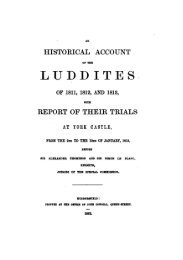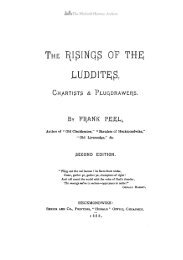OLD MIRFIELD DAYS - Mirfield - A Second Look
OLD MIRFIELD DAYS - Mirfield - A Second Look
OLD MIRFIELD DAYS - Mirfield - A Second Look
Create successful ePaper yourself
Turn your PDF publications into a flip-book with our unique Google optimized e-Paper software.
that on this occasion, in order to safeguard our collective journey to another place in the far away<br />
future, a journey that her parson friend could veto in the event of an unsatisfactory answer, she just<br />
smiled, and the parson smiled too. His name was McWatters, he was a curate and perhaps being just a<br />
curate would prevent from having all the powers he would later possess. This was before the time of<br />
Mr. Krushchev and his friends. Had my mother's visitor been other than the parson, she would have<br />
acclaimed the origin of the spurs and lucky bones from the fighting cocks with some relish. They were<br />
part of the family's traditional connection with hunting, cock fighting, horse dealing, dog running in<br />
fact all the sports and pastimes of a bygone age, some now frowned upon.<br />
Compared with things that have happened since in the name of sport, why, these old sports were as<br />
bright and fresh as a primrose on Easter Day, ( a German soldier tried to kill me one Easter Day). It is<br />
recorded that Charles II gave Nell Gwynn a pair of silver cock spurs, he also had a Master of<br />
Cockfighting, and Sir George Vernon of Madden Hall received £2 from the household purse every time<br />
he went to a cock fight, so it was truly one of the Royal sports, I should think that my Grandmother<br />
would think nothing wrong of the fighting involved, the men folk in her family have fought for<br />
everything including fighting Cromwell in the Civil Wars, a Captain James Schofield commanded the<br />
Royalist forces charged with the defence of Bolton, in the process he was skinned financially and was<br />
as poor as a crow he said. Since then they have worn black eyes over a lovely girl, a doubtful horse, a<br />
screw cow, and many times on cocking days. My eldest brother told me of going to a main between<br />
Yorkshire and Lancashire in the narrow ride near Toppits top, he said he never thought there were as<br />
many golden sovereigns as he saw that day. Another cockpit was near Boyfe Hall with one nearer to<br />
Colne Bridge and Yetton was the home of the "Cockers".<br />
All in all, I suppose that cock fighting in its day would occupy a place in the social life of a village on a<br />
par with the present day cricket or football team. My Grandmother's family, the Schofields, she was my<br />
father's mother, were heafted in the Stannage area, they have been so since the 1500's. an area where<br />
parsons and bobbies did not abound and the wild moor edge was the venue for all the old sports.<br />
Hunting days were nearly every day; in its turn the wild moor cock would be coaxed end beaten from<br />
its heather bed, on the few days it could be so treated. There is a lot of hypocrisy regarding the socalled<br />
blood sports, a woman blasted me not many weeks ago about the horse trade and the final<br />
destiny of a lot of these animals. She wore a sheep skin coat, had leather shoes, a feather in her hat and<br />
was in a butchers shop! She was buying chops, steak and liver, when I asked her what she thought<br />
these poor so and so's thought of the job she seemed surprised, but told me that all these things were the<br />
source of the protein she required including I suppose the old "tups" coat she wore. I detest cruelty of<br />
any kind and so do most of my friends.<br />
Poaching was a popular pastime too, both for the pot, for fun, and to beat the keepers. It was usually a<br />
family tradition, well known local families would indulge and were prepared to take on all-comers<br />
which they did many times. I remember once a gang had been caught in the local wood and the keepers<br />
and one policeman took them to the big house, and ushered them into the drawing room, and behold,<br />
the big man's son and a well known local butcher, they were all good fellows and kept law and order<br />
themselves.<br />
One morning, very early, a fellow I knew well had to go up the Toppits to his work at Lepton, this<br />
morning a family and friends were netting the wall from the middle gate to the bottom, and a good job<br />
they made, they had dozens of rabbits fast in the net and as my friend approached he was saluted with a<br />
cheery "How do", but much to his surprise he was shanghaied, and set to work. He was aboard the<br />
"Bounty" alright and for once Captain Bligh and Fletcher Christian were good pals. Everybody worked<br />
for the next half hour all the rabbits were gutted and put in sacks and other fellows were taking a net in<br />
that had been set on pegs for hares or used as a draw net for partridge, they had six hares and two<br />
partridges a good night's work, they had parked an old van in a yard that they passed, they would pay<br />
the farmer a toll in the shape of game and everybody was happy. Our friend prepared to leave his<br />
fellow crew members, but do not be so sharp, "you had better ride back part way with us", Dick<br />
protested and said he would be deaf and dumb as far as the hair was concerned, but he had to go and<br />
finished up walking back from this side of Barnsley. He was no "Flaidly Cat". Before this book is done<br />
you will have an account of on escapade of his that will both surprise and shock you, and it will all be<br />
true.<br />
Directly facing you when you cross the old bridge at Hopton, the Ledgard Bridge 1800, there is what<br />
was formerly called the coal yard, it was in fact the coal yard, and was an area that provided the exit for<br />
a day hole that operated under the land above the Waste, an old Hopton fellow Harry Oldroyd used to<br />
tell me about riding back into the pit to an engine house, properly built, with winding machinery<br />
installed, situated under the Co-op Field, do you remember where we used to sit on a steep bank to<br />
listen to Punch & Judy on the old Co-op do days? Well it was lower down the field and nearer to the<br />
Nursery Plantation. At the exit end in the coal yard a scoop track started and ran on the roadside in<br />
15




